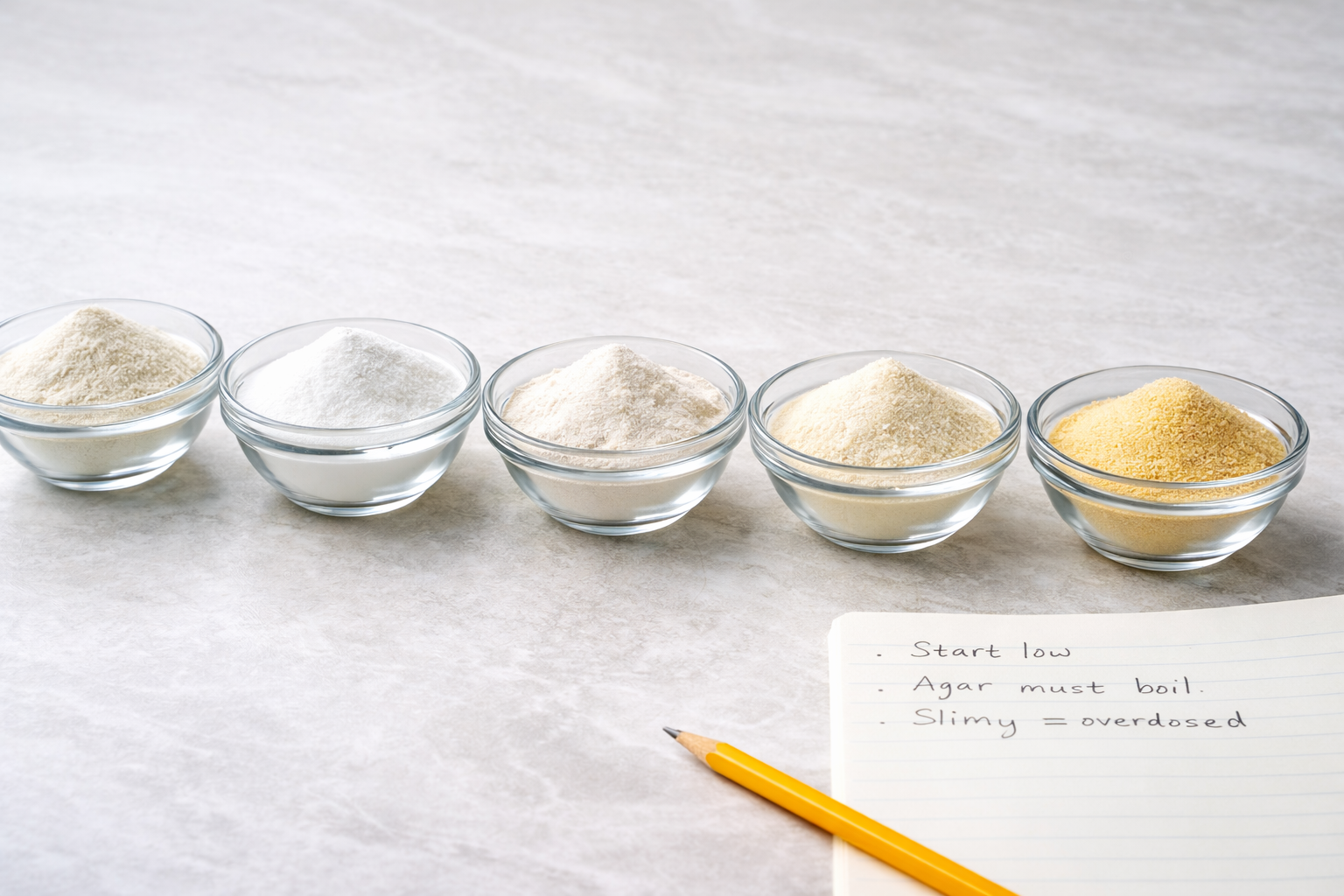
What is Monocalcium Phosphate? Exploring its Uses and Benefits
SUBSCRIBE TO OUR BLOG
Promotions, new products, and recipes.
What Is Monocalcium Phosphate? Uses, Benefits, and Safety
Monocalcium phosphate is a calcium–phosphate compound widely used in food, baking, animal feed, fertilizers, and other industrial applications. It is produced by reacting calcium hydroxide with phosphoric acid, creating a white, free-flowing powder with useful nutritional and functional properties.
In this article, we’ll look at what monocalcium phosphate is, how it’s made, why it’s used in baking powders and fertilizers, and what you should know about its safety, handling, and environmental impact.
Key Takeaways
- Monocalcium phosphate is a versatile calcium–phosphate compound used in food, feed, fertilizers, and other industries.
- It is synthesized by reacting calcium hydroxide with phosphoric acid under controlled conditions.
- In baking, it works as a key acid in baking powder, helping dough and batters rise.
- It is a source of essential nutrients like phosphorus and calcium in both human and animal nutrition.
- Safe handling follows guidelines in the Material Safety Data Sheet (MSDS) and good manufacturing practices.
Understanding Monocalcium Phosphate Production
Monocalcium phosphate is typically synthesized from calcium hydroxide and phosphoric acid. The reaction is carried out in a controlled environment to ensure purity, consistency, and safety:
Ca(OH)₂ + H₃PO₄ → Ca(H₂PO₄)₂ + 2H₂O
After the reaction, the product is purified, dried, and milled into a powder. Throughout production, manufacturers follow MSDS guidelines and process controls to prevent contamination, protect workers, and minimize environmental impact.
As demand for monocalcium phosphate rises across food, agriculture, and nutrition sectors, producers are adopting more efficient and sustainable technologies to reduce waste and energy use.
The Role of Monocalcium Phosphate in Baking
Monocalcium phosphate (MCP) is a key leavening acid in modern baking. When combined with baking soda and a liquid, MCP reacts to produce carbon dioxide gas. As the gas expands in the oven, it helps doughs and batters rise, creating a light, airy texture.
MCP is widely used in commercial baking powders, which typically contain an acid (like MCP), a base (baking soda), and a starch to keep the mixture dry and free-flowing.
Early leavening relied on yeast, which produces carbon dioxide during fermentation. Yeast is still critical in bread baking, but it requires proofing time and careful temperature control. Chemical leaveners, like baking powder, offer a faster and more predictable option.
Traditional baking powders used cream of tartar as the acid component, but shelf-life and off-flavors were common problems. MCP was introduced in the late 1800s as a more stable, reliable leavening acid. It reacts with baking soda in the presence of moisture, producing carbon dioxide without relying on fermentation.
Today, MCP is standard in most commercial baking powders. These blends provide quick and consistent leavening for biscuits, muffins, pancakes, and cakes.
In short, MCP is an essential ingredient in modern baking, delivering dependable rise and improving the texture and quality of baked goods.
Monocalcium Phosphate as a Food Additive
Monocalcium phosphate is widely used as a food additive due to its versatility and safety profile. It is approved as Generally Recognized as Safe (GRAS) by the FDA and appears in baked goods, cheese, processed meats, and some canned fruits and vegetables.
As a leavening agent, monocalcium phosphate works with baking soda to create carbon dioxide, helping doughs and batters rise. In dairy processing, it may be used to help manage pH and texture. In some canned products, it can act as a firming agent or help prevent quality loss during storage.
“Monocalcium phosphate is widely used as a food additive due to its versatility.”
Beyond texture and pH control, monocalcium phosphate also contributes calcium and phosphorus. As a form of calcium that the body can absorb, it is sometimes included in fortified foods and dietary supplements.
Benefits of Monocalcium Phosphate as a Supplement
Monocalcium phosphate supplements provide concentrated calcium and phosphorus—two minerals that support bone health and many metabolic processes. Calcium is essential for bone density, nerve signaling, muscle contraction, and blood clotting; phosphorus helps with energy production, cell membrane structure, and DNA synthesis.
Some research suggests that adequate calcium intake may help support healthy blood pressure and contribute to better metabolic health in certain populations. However, supplements should be used to complement, not replace, a balanced diet.
Anyone considering monocalcium phosphate supplements should consult a healthcare provider to determine appropriate dosage and to evaluate potential interactions with medications or other supplements.
Monocalcium Phosphate in Fertilizers
Monocalcium phosphate is also an important component in phosphorus-based fertilizers. Because it is water-soluble, it delivers plant-available phosphorus and calcium efficiently to crops, supporting root development, flowering, and yield.
Fertilizers containing monocalcium phosphate are sometimes marketed as superphosphate or triple superphosphate products, depending on the phosphorus concentration. These formulations are widely used in commercial agriculture to enhance soil fertility.
| Advantages | Disadvantages |
|---|---|
| Provides essential nutrients like phosphorus and calcium | High phosphorus use can contribute to soil and water contamination |
| Water-soluble and readily absorbed by plants | May contribute to eutrophication if runoff reaches waterways |
| Can improve soil fertility and pH in acidic soils | Long-term overuse can lead to salt build-up in soil |
Used responsibly and at appropriate rates, monocalcium phosphate fertilizers can improve crop performance and support food production. Best practices in nutrient management help minimize runoff and environmental impact.
Monocalcium Phosphate in Animal Feed
Monocalcium phosphate is a common mineral source in animal feed because it supplies highly available phosphorus and calcium. These minerals are vital for bone development, energy metabolism, reproductive performance, and overall growth in livestock.
| Benefits of Monocalcium Phosphate in Animal Feed |
|---|
| • Improves feed efficiency |
| • Promotes bone development in young animals |
| • Supports fertility and reproductive health |
| • Helps maintain overall health and growth |
Monocalcium phosphate is typically added as granules or powder in premixes and complete feeds. Because excessive phosphorus can cause health and environmental problems, nutritionists carefully balance inclusion levels and monitor overall mineral intake.
Safety and Handling of Monocalcium Phosphate
Monocalcium phosphate is widely considered safe when used as intended in food, feed, and fertilizer applications. Still, standard safety measures apply when handling any industrial powder.
Material Safety Data Sheet (MSDS)
According to typical Material Safety Data Sheets (MSDS), monocalcium phosphate is classified as non-hazardous under normal conditions of use. Recommended precautions include:
- Wearing appropriate protective clothing (gloves, goggles) to avoid eye and skin irritation.
- Avoiding inhalation of dust; using local exhaust or respiratory protection if needed.
- Storing in a cool, dry, well-ventilated area away from incompatible materials.
- Keeping containers closed when not in use to minimize dust and moisture uptake.
Disposal
Disposal should follow local regulations. In many regions, monocalcium phosphate can be disposed of as non-hazardous solid waste, but always confirm with local authorities or waste management providers.
The Role of Phosphorus in Monocalcium Phosphate
Phosphorus makes up roughly 22% of monocalcium phosphate by weight and is central to its nutritional and agronomic value. In the body, phosphorus is part of ATP (energy transfer), DNA and RNA, and phospholipids in cell membranes. In bones and teeth, it works alongside calcium to maintain structure and strength.
In plants, phosphorus is critical for root development, energy transfer, and overall growth. The phosphorus in monocalcium phosphate is highly available and readily absorbed, making it useful in fertilizers and feed.
However, excessive phosphorus application can contribute to runoff, harmful algal blooms, and ecological damage. Responsible use, soil testing, and nutrient management plans are essential.
Applications of Monocalcium Phosphate in Other Industries
Beyond food, feed, and fertilizers, monocalcium phosphate appears in several other applications:
- Dental materials: Used as a component in some dental cements and restorative materials.
- Toothpaste and oral care: Included as a mild abrasive and polishing agent.
- Fire extinguishers: Used in some formulations for Class A fires involving paper, wood, and textiles.
- Industrial processes: Acts as a buffering agent in detergents, textile processing, paper production, and oil drilling fluids.
Environmental Impact of Monocalcium Phosphate
The main environmental concerns with monocalcium phosphate revolve around phosphorus use and phosphate rock mining. Over-application of phosphorus-containing fertilizers can lead to nutrient runoff, which fuels algal blooms, depletes oxygen in water bodies, and harms aquatic life.
Phosphate rock mining can cause soil erosion, habitat loss, and large volumes of waste by-products like phosphogypsum. Some waste streams may contain trace contaminants, raising long-term storage and management issues.
To reduce impacts, producers and regulators are working on:
- Improved nutrient management and precision fertilization.
- Recovering phosphorus from waste streams and manures for reuse.
- Developing more sustainable mining and processing practices.
Conclusion
Monocalcium phosphate is a workhorse ingredient that quietly supports modern baking, food manufacturing, animal nutrition, and crop production. It helps baked goods rise, enriches foods and feeds with calcium and phosphorus, and improves soil fertility when used responsibly.
Like many useful ingredients, its benefits come with responsibilities: safe handling, appropriate dosing, and attention to environmental impact. With thoughtful use, monocalcium phosphate can continue to play an important role in food systems, agriculture, and industry.
For more background on functional ingredients and labels, see: Everything You Need to Know About Food Additives and The Hydrocolloid Glossary.
FAQ
What is monocalcium phosphate?
Monocalcium phosphate is a calcium–phosphate compound produced by reacting calcium hydroxide with phosphoric acid. It is used as a leavening acid in baking powders, a food additive, a mineral supplement, a fertilizer ingredient, and a feed phosphate for animals.
What are the main uses of monocalcium phosphate?
Monocalcium phosphate is used in baking as a leavening agent, as a food additive for texture and fortification, as a source of phosphorus and calcium in animal feed, and as a phosphorus source in fertilizers. It also appears in some dental, personal care, and industrial products.
Is monocalcium phosphate safe to eat?
Yes. Monocalcium phosphate is approved as Generally Recognized as Safe (GRAS) when used as intended in foods. It has a long history of use in baking powders and processed foods. As with any additive, it should be consumed as part of an overall balanced diet.
How does monocalcium phosphate work in baking powder?
In baking powder, monocalcium phosphate provides the acidic component that reacts with baking soda. When combined with water and heat, this acid–base reaction releases carbon dioxide gas, helping batter or dough rise and creating a lighter texture.
What role does phosphorus play in monocalcium phosphate?
Phosphorus is a key part of the monocalcium phosphate molecule and is essential for bones, teeth, energy metabolism, and cellular function in humans and animals. In plants, phosphorus supports root development and growth, which is why monocalcium phosphate is valuable in fertilizers and feed.
Is monocalcium phosphate environmentally friendly?
Monocalcium phosphate itself is a useful nutrient source, but excessive use of phosphorus-containing fertilizers can contribute to water pollution and algal blooms. Sustainable nutrient management, appropriate application rates, and improved recovery of phosphorus from waste streams help reduce its environmental footprint.

|
About the Author Ed is the founder of Cape Crystal Brands, editor of the Beginner’s Guide to Hydrocolloids, and a passionate advocate for making food science accessible to all. Discover premium ingredients, expert resources, and free formulation tools at capecrystalbrands.com/tools. — Ed |
Enjoyed this post? Subscribe to The Crystal Scoop
Food-science tips, ingredient know-how, and recipes. No spam—unsubscribe anytime.
- Choosing a selection results in a full page refresh.



